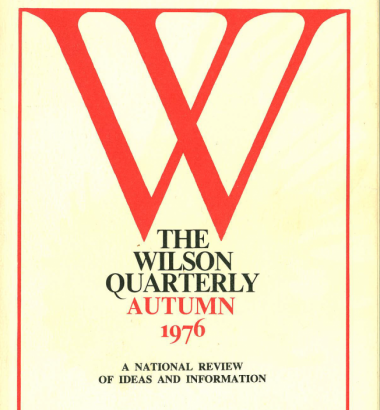
Editor's Comment
Four decades of classic essays . . . with gratitude.

Four decades of classic essays . . . with gratitude.
My predecessor, Jay Tolson, once wrote in this space that The Wilson Quarterly is a magazine that moves forward by looking backward, like a rower in a scull. It is especially appropriate to look back now because following this issue, after 36 years in print and two as a tablet magazine, the WQ will assume a new form with different leadership.
In this issue we have reached back to present some of the classic essays we have published since the magazine’s founding by Peter Braestrup in 1976, touching on many of the themes that have animated the WQ, from American civic life to global affairs. This has always been a magazine for intellectually curious readers, and reading one past issue after another, I have been struck by the range and depth of our offerings, covering an array of subjects that would have impressed even the great encyclopedist Denis Diderot. I am also struck by the enormous effort made by our small, dedicated staff to produce, each quarter, a volume of superior writing equivalent to a book.
We have been fortunate to present the work of some of the leading writers and thinkers of our time—including Daniel Bell, Carlos Fuentes, Richard Rorty, and E. O. Wilson—and to have brought to readers’ attention a number of rising intellectuals, such as Andrew Bacevich and Amy Chua. In “The Second Coming of the American Small Town” (Winter 1992), by Andrés Duany and Elizabeth Plater-Zyberk, we introduced New Urbanist ideas about the making of neighborhoods and cities—ideas that have since reshaped the American landscape and become conventional wisdom. That essay could not be included in this issue, but as part of the WQ’s transition the magazine’s complete archives are now open to all through the Web site.
For all its concern with the big questions of our time, the WQ has taken a practical, even workmanlike approach to ideas. Like a teenager obsessed with computers or cars, we have always wanted to know: How does this thing work? In our case, the thing is the world. Our question has led us down many roads and yielded many shimmering bits of illumination. “Darwin’s Worms,” Amy Stewart’s essay in the Winter 2004 issue on the great scientist’s lifelong fascination with earthworms, revealed his conclusion that the fine dust that mysteriously falls on ships at sea is the product of earthworm castings. How remarkable that he even asked, and then published a paper on the subject. In the same issue’s In Essence section (then called The Periodical Observer), we reported on a scholar’s argument that the Enlightenment was partly stimulated by the introduction of coffee and tea in Europe. The item opened with Samuel Johnson’s thundering peroration against sleep: “Short, O short then be thy reign/ And give us to the world again!”
Curiosity has been the great driver of the WQ, and the uniting spirit of its readers. Curiosity inspires the constant questioning of received ideas, and we have been particularly proud over the years of publishing views at odds with our own—and of baffling those who have tried to pin a political label on the magazine. This is not a matter of mere vanity. From its beginning in 1976, the WQ has proceeded—even crusaded—in the classic liberal spirit of open inquiry and debate. If we have been even a minor beacon of the liberal idea, it is our proudest accomplishment.
It has been a great privilege for me to have been part of the WQ’s journey for 33 years, serving as editor since 1999. Gratitude is the word that describes my feelings—and, I can say with confidence, the feelings of my many WQ colleagues over the years—about the opportunity to have been part of this great enterprise. With them, I deeply thank the writers and readers who have made everything possible.
-Steven Lagerfeld